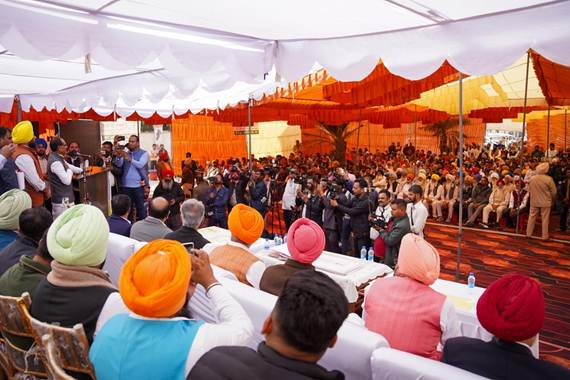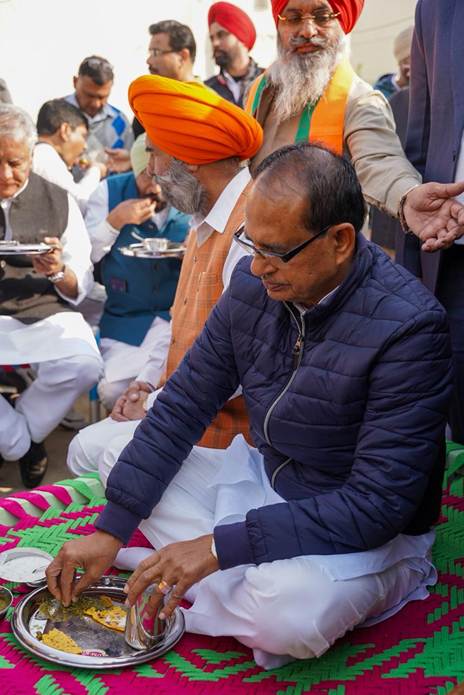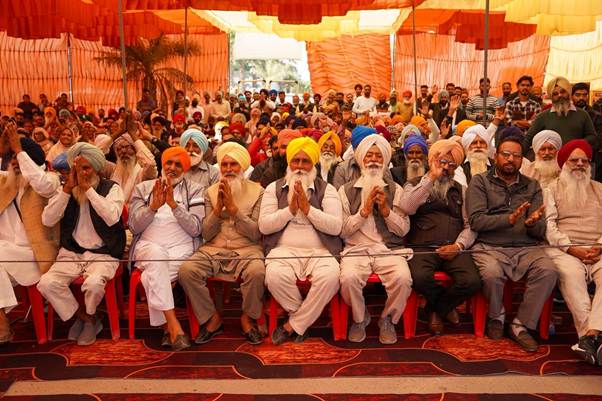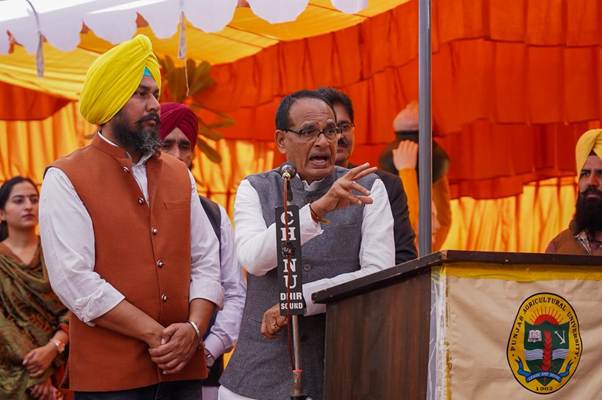Ministry of Agriculture &
Farmers Welfare
Union Agriculture Minister Shri Shivraj Singh Chouhan undertakes one-day visit to Punjab; interacts with farmers, villagers and stakeholders in Ransih Kalan village, Moga
Union Minister praises Ransih Kalan village for its remarkable achievement of not burning stubble for the past six years and managing it properly; extends congratulations to all
“Mixing stubble back into the field improves crop quality and saves fertiliser, water and money”: Shri Shivraj Singh
“Punjab has taught us a lot; stubble is not a burden but a boon, Ransih Kalan is a school of knowledge and a centre of inspiration”: Shri Chouhan
“Stubble burning incidents in Punjab down by 83 per cent this year”: Shri Shivraj Singh Chouhan
“Stubble burning incidents in Punjab fall from 83,000 to 5,000, a major success”: Shri Chouhan
“Will hold a brainstorming meeting with farmers and prepare five-year plans for agriculture”: Shri Chouhan
Union Agriculture Minister says Ransih Kalan village will be presented as a model across the country
“Government procures wheat and paddy at MSP and will certainly continue to do so”: Shri Shivraj Singh Chouhan
“Will also procure lentil, pigeon pea, black gram and chickpea at MSP, farmers will get full value for their sweat and hardwork”: Union Agriculture Minister
“Will make every possible effort for Punjab’s development under the Prime Minister’s leadership”: Shri Shivraj Singh
Union Agriculture Minister directs that Custom Hiring Centres must be developed as mechanisation centres
Posted On:
27 NOV 2025 5:07PM by PIB Delhi
Union Minister for Agriculture & Farmers’ Welfare, and Rural Development, Shri Shivraj Singh Chouhan, is on a one-day visit to Punjab today. During the visit, the Union Minister met farmers, villagers and stakeholders in Ransih Kalan village of Moga and lauded them for their remarkable achievement of not burning stubble for the last six years and for exemplary stubble management, extending his congratulations to all.

Before the main event, the Union Minister spoke to the media and noted that incidents of stubble burning had worried the entire country. He said that while stubble burning may leave fields clean, it also destroys beneficial insects and creates serious pollution problems.
“I have come today to congratulate Punjab and take the state’s stubble management experiment to the entire country. Stubble burning incidents in Punjab have fallen by 83 per cent this year. Earlier, there used to be around 83,000 incidents of stubble burning; now they have reduced to nearly 5,000,” the Union Minister said.
Further, the Union Agriculture Minister said, “Farmer brothers and sisters ask what the alternative is if they do not burn stubble. How should they clear the fields for sowing wheat and other crops? Ransih Kalan village has experimented to answer these questions. Ransih Kalan has set an example. For the past six years, stubble has not been burnt here. Farmers here mix the stubble directly into the fields and carry out direct seeding.”

Addressing the main programme, Union Agriculture Minister Shri Chouhan said that a few days ago he had read about Ransih Kalan village. Here, stubble has not been treated as a burden, but turned into a boon. Ransih Kalan is an example of a village that believes in giving rather than asking. He said that as Union Agriculture Minister, he considers it essential to go to farmers and fields and interact directly with farmers, because without this it is not possible to work properly for farmers’ welfare.
The Union Minister said that after stubble burning, water has to be applied to the fields and then the land is prepared for sowing. In contrast, by following the management practices of Ransih Kalan, harvesting can be done with a Happy Seeder and the stubble can be mixed into the soil, after which direct seeding can be done without applying water. This saves both water and diesel. Stubble contains potash, which benefits the soil when mixed in. Weeds are reduced and soil moisture is retained. Mixing stubble into the fields increases soil organic carbon and reduces the need for fertilisers. The Union Minister said that the village sarpanch informed him that where earlier one and a half bags of DAP were used, now only one bag is needed, and instead of three bags of urea, only two bags are sufficient. This is clear evidence of cost savings.

The Union Minister said that he also inspected the fields, and mixing stubble into the soil has not affected crop quality or yield. The potential yield remains about 20 to 22 quintals per acre.
The Union Minister added that this experiment in stubble management is highly beneficial not only for wheat but also for potato cultivation. He said that a farmer informed him that where potash had to be applied earlier in potato fields, it is no longer required because the stubble itself meets the need for zinc and potash. As a result, potato size is bigger, quality improves and costs are reduced.
Shri Chouhan said that he also visited mustard fields. There too, several benefits of cutting stubble and mixing it into the soil were observed. Through this approach, farmers can increase profits in mustard cultivation as well, with less fertiliser and water while raising productivity.
The Union Minister described Ransih Kalan as a school from which much can be learnt. Under the leadership of the village sarpanch, commendable work has been done not only in stubble management but also in optimum use of leftover water in bottles, rainwater harvesting, plastic management, and the creation of lakes, parks and a library. The anti-drug campaign in the village is also a significant achievement. The Agriculture Minister said that the village has demonstrated exceptional development in multiple areas. Because of underground drainage, there is no problem of dengue and malaria in the village. The Union Minister praised Sarpanch Preet Inderpal Singh Mintu and said that his good work has given everyone a reason to feel proud.
Further, Agriculture Minister Shri Shivraj Singh said that from the sacred land of Ransih Kalan he wishes to send a message to farmers across India to adopt this successful stubble management model in their own areas. In this way, pollution can be reduced and the earth can be made more productive.

Shri Chouhan said that he has decided to sit with selected farmer brothers and sisters, discuss ideas with them and, under the leadership of Prime Minister Shri Narendra Modi, draw up five-year plans for transforming agriculture. A brainstorming meeting on this is proposed to be held on December 22–23. Similar efforts will also be undertaken in the field of rural development.
The Union Minister said that proposals also come from small farmers regarding purchase of machinery, and efforts are being made in this regard. He has directed the Director General of the Indian Council of Agricultural Research, Dr. M. L. Jat, to arrange for Custom Hiring Centres to function as centres of mechanisation as well, and to prepare a plan for mechanisation. He said that every small farmer cannot buy a machine, so it is necessary to create a system where, even if a farmer does not own a machine individually, work can be done using machinery available with a group. There should be a system in which farmers can meet their needs by hiring machines on rent.
Shri Chouhan also discussed the ‘Self-Reliance in Pulses Mission’ and said that the government is striving to increase pulse production through this initiative. Where pulses are grown, the government will provide subsidies to set up dal mills. The Union Minister said that the government has been procuring wheat and paddy and will certainly continue to do so in future. Along with this, the government will also procure whatever quantity of lentil, pigeon pea, black gram and chickpea farmers produce at MSP. Farmers will be given the full value of their sweat.
In conclusion, the Union Agriculture Minister said that Punjab is like a centre of knowledge. One feels like coming here again and again to learn. Punjab has taught the country a great deal in agriculture. He said he feels delighted to be in Punjab and that, under the Prime Minister’s leadership, every possible effort will be made for the development of Punjab.
***
RC/AR
(Release ID: 2195390)
Visitor Counter : 842